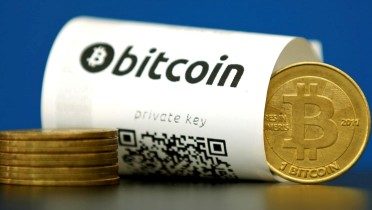What is Bitcoin?
Bitcoin (BTC) is a decentralized digital currency originally described in a thesis paper in 2008 and launched in 2009 by pseudonymous  computer programmer Satoshi Nakamoto. Bitcoins have real-world value and can be traded or exchanged for almost any world currency, as well as an increasing number of goods and services.

The production of Bitcoin and rate of introduction into the Bitcoin¬†economy is governed by an open-source program (the ‚ÄúBitcoin Protocol‚ÄĚ) designed¬†to decrease Bitcoin production by half every four years until 21 million Bitcoin¬†are produced in the year 2140, at which point Bitcoin production will¬†permanently stop.
The Bitcoin network operates on a peer-to-peer platform which is powered by its users. It is not owned or operated by any central authority or network, and is not directly regulated by any government[1]. There are two ways to acquire Bitcoin: by purchase or by mining. Bitcoins can be purchased online  using a number of online brokers and exchanges. Bitcoin mining requires the miner to contribute significant  computer processing resources (and electricity) to the Bitcoin network in order to facilitate Bitcoin transactions and maintain the security of the Bitcoin network. Whereas banks and credit card companies facilitate credit & debit transactions, Bitcoin transactions are facilitated by a vast peer-to-peer network of individual miners.
[1] Although Bitcoin is currently unregulated, the US Government has made recent efforts to regulate the Bitcoin economy by requiring brokers and other Bitcoin intermediaries to comply with recordkeeping and reporting responsibilities  required by the Financial Crimes Enforcement Network (FinCEN).
Bitcoin Addresses & Wallets
Bitcoin payments are made to Bitcoin addresses (‚Äúpublic keys‚ÄĚ) which are represented by an alphanumeric string about 33 characters in length and are associated with a ‚Äúprivate key‚ÄĚ contained in a secure, software-based Bitcoin ‚Äúwallet.‚ÄĚ Bitcoin wallets are used to store, receive, and transfer Bitcoins. A Bitcoin address and its associated private key are linked using cryptography.
The private key proves a person’s right to spend Bitcoin from a specific Bitcoin address through cryptographic signatures. The public key is a reference point for Bitcoin miners to verify transactions, but only the owner of a Bitcoin wallet has access to the private key which must be used to complete a transaction. Multiple Bitcoin addresses can be generated by one person and it is recommended for security purposes that Bitcoin users generate a new Bitcoin addresses for each transaction made.
Bitcoin is Not Entirely Anonymous
It is widely stated that Bitcoin addresses are anonymous, but they are in fact pseudo-anonymous. While no personal information is connected to any Bitcoin address, data on all Bitcoin transactions is permanently stored on a ‚Äúpublic key‚ÄĚ and can be viewed by anyone. Some Bitcoin transactions require buyers/sellers to provide some personal information. For example, many Bitcoin Exchangers requires significant verification (including bills containing a verifiable address) for members of its exchange. However, enhance anonymity can be achieved by using a different Bitcoin address for each transaction. (Bitcoin.org/en/you-need-to-know)
This public key functions as a reference point for Bitcoin miners to facilitate transactions by authenticating the transaction itself, as well as validating Bitcoin authenticity and proof of ownership.
I am a Blogger making a full time income online since 2010 (read more about me). I invite you to read my HYIP reviews and Download The Beginners Guide To Online Investing to learn how to earn money investing online.














Bitcoins price passed $7000, earnings from buying bitcoin can be higher than playing with hyips
6 months later Bitcoin is over $9k